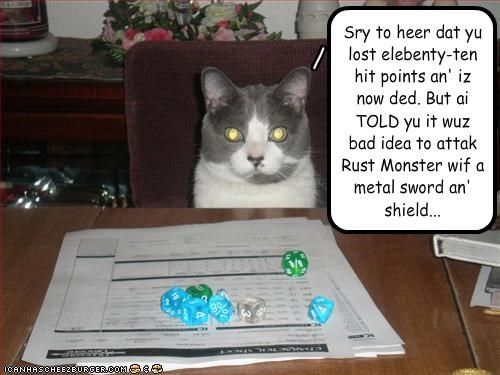Harv
Emperor
- Joined
- Dec 16, 2008
- Messages
- 1,987
I could do that in 12 minutes when I was 11 and short.
Then you run 5k in 19 or 20 minutes or even less now if you are a runner?
I could do that in 12 minutes when I was 11 and short.
Then you run 5k in 19 or 20 minutes or even less now if you are a runner?
Given how godawful the design for skill checks in DnD is (D20+skill modifier that's a fraction of your skill), it doesn't surprise me in the least that they pretend those things don't require any skill check. When your entire skill check system is built around high-randomess, low-skill-relevance, you have to. (The fact that DnD 5e barely even acknowledges skills and then only in relatively minor roles make it clear how much of a joke the system is)
And of course, correct me if I'm wrong, but doesn't average dex carry no bonuses to skill checks anyway?
But in any event using the relative inadequacies of your system to pretend people today aren't dextrous is a joke.
(As for horseback riding vs car driving (assuming a well-trained, well-behaved horse and no strenous riding, jumping, etc*, just standard trot and the ilk), while it require some dexterity, comparing it to the reflexes one needs to not kill people while rolling at 100 km/h is...questionable? (I've been on a horseback at a trot, and I've been behind the driving wheel, and one of these is considerably easier than the other by any fair test).
*Which no reasonable system would allow without a check
Maybe, I don't typically race, so I'm not sure what my 5k time would be - comfortable jogging pace is under 25. It's not particularly relevant though, my point was a counter-example to "being short makes two miles in 16 minutes difficult".
I found the religion questions on this test a bit odd, though.
I'm guessing that people who score exceptionally high on religious questions end up being clerics or paladins.I found the religion questions on this test a bit odd, though.

I'm guessing that people who score exceptionally high on religious questions end up being clerics or paladins.
Still disagreed on pretty much every aspect of what you say. At this point, it seems to me you're going to find reasons to look down on modern dex simply because it's a physical stat and you're utterly convinced the modern world is bad at everything physical.
Does the fact that we're worse than peasants at everything physical imply we are in turn better at everything non-physical, or does it imply that peasants, being better than us at physical, equal at cha and wis and (I presume) inferior at INT, are just plain superior beings to modern people?
The former (we being better at wis and cha) seems to be waaaay questionable, and the later make my case for me about rose-colored glasses
It could also have to do with the perception of the Monk character class. AD&D Monks are usually thought of as the Eastern martial arts-warrior kind of character, whereas the RL western kind of monk who lives and works in a monastery would fall under the category of the Cleric character class.The questions that really puzzled me were the ones that basically asked what you thought about Western/New Age/Eastern religion. Actually, now that I think about it, perhaps I shouldn't be too puzzled; I'm guessing based on stereotypes the New Age and Eastern religions probably lean towards a more "mystical" sort of character. Of course, being of an eastern/Asian background, I naturally lean towards Eastern religion the most out of general familiarity so I felt my input there made the end results a little less accurate since I'm assuming eastern religion to me has a different connotation than to whoever made the test.
It could also have to do with the perception of the Monk character class. AD&D Monks are usually thought of as the Eastern martial arts-warrior kind of character, whereas the RL western kind of monk who lives and works in a monastery would fall under the category of the Cleric character class.
Keep in mind that I'm only familiar with AD&D as far as 2nd edition. I have no idea what changes were made in later editions.
 )
)However, the D&D setting is not quite the same as medieval. It is a fantasy setting. I think the nutritional standards in the fantasy D&D setting are superior to a historical medieval setting.
But I'm not budging on dexterity not having changed in any noticeable downard manner.

As for myself, the question of my GMing style in DnD is moot, because I'm running my own system like I mentioned, where the question would be very different since a lot of what we're discussing about ability to perform certain tasks would fall under skills, not attributes. Somethign the DnD take on the skill system really cannot represent effectively.
Trait+Skill+D10 is a pretty dang simple system as far as these go.
Arguably just as simple as D20+Trait-modifier-which-is-not-your-actual-trait-itself. And while it take a little more time at creaiton, it gives a far more diverse and flexible character creation environment.
